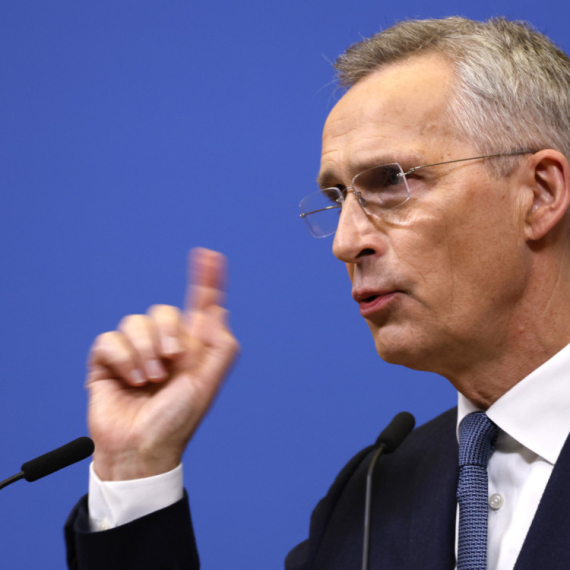12 years since PM Đinđić’s government was formed
The Democratic Party (DS) has stated that today marks 12 years since the government of late Prime Minister Zoran Đinđić was formed.
Friday, 25.01.2013.
16:31

BELGRADE The Democratic Party (DS) has stated that today marks 12 years since the government of late Prime Minister Zoran Djindjic was formed. The DS noted that Djindjic’s vision and mission still existed today. 12 years since PM Djindjic’s government was formed “Zoran Djindjic believed that Serbia’s priorities needed to be reconciliation in the region, judicial reform, independent institutions, attracting of foreign investments, construction of infrastructure, investments in education and modern and European Serbia,” the DS said in the release. “Those are Serbia’s priorities today and his words that politicians get their mandates from citizens to make changes and that they lose once the politicians think that they have gotten the mandate to rule are a warning to everyone,” reads the statement. The first democratic government after October 5 changes was formed on January 25, 2001 and Djindjic became a prime minister. The forming of the government followed after a three-month mandate of an interim government that was formed after October 5, 2000. The government led by Djindjic was formed by the Democratic Opposition of Serbia (DOS) coalition and it consisted of 18 parties. It had seven deputy prime ministers, 17 ministries and 16 ministers. Zarko Korac, Nebojsa Covic, Dusan Mihajlovic, Jozef Kasa, Momcilo Perisic, Aleksandar Pravdic and Vuk Obradovic were the deputy prime ministers. In an expose that he presented to MPs, Djindjic said that Serbia “has taken its destiny back in its hands” after October 5 and that his government “has received a mandate for changes from the people in the streets of Serbia”. “The day we forget that and think we have gotten the mandate to rule and steer will be the day we lose,” he told the MPs in the Serbian parliament. “The situation we found is dramatically bad. The task we are assuming today as a heritage of the past ten years is very hard and challenges are very big but a chance to become a part of history as a generation that has returned a country back on the right track is also very big,” Djindjic noted. For him, the forming of the first democratic government was a beginning of the implementation of a national consensus for thorough changes and a return of the country’s credibility, that required a general political stability in the region, including regulation of relations between Serbia and Montenegro, tackling terrorism in southern Serbia and finding a solution for Kosovo. Djindjic pointed out at the time that it was necessary to have good legislation, high-quality traffic infrastructure, qualified and reliable manpower. The first democratic PM set a goal for its government – that Serbia will join the EU in 10 years and that his government would after its four-year mandate leave the country in progress and prosperity. The first session of the government was held immediately after the ministers had been sworn in. “We will elect a secretary general of the government and some bodies but the topic we will discuss tonight is what we have promised to the citizens and that is state and public security, meaning establishment of those services and issuing orders to solve crimes such as politically motivated murders,” Djindjic said ahead of the session. The realization of the goals set by Djindjic was cut short when he was assassinated in front of the government headquarters on March 12, 2003. Zoran Djindjic (Tanjug, file) B92
12 years since PM Đinđić’s government was formed
“Zoran Đinđić believed that Serbia’s priorities needed to be reconciliation in the region, judicial reform, independent institutions, attracting of foreign investments, construction of infrastructure, investments in education and modern and European Serbia,” the DS said in the release.“Those are Serbia’s priorities today and his words that politicians get their mandates from citizens to make changes and that they lose once the politicians think that they have gotten the mandate to rule are a warning to everyone,” reads the statement.
The first democratic government after October 5 changes was formed on January 25, 2001 and Đinđić became a prime minister.
The forming of the government followed after a three-month mandate of an interim government that was formed after October 5, 2000.
The government led by Đinđić was formed by the Democratic Opposition of Serbia (DOS) coalition and it consisted of 18 parties. It had seven deputy prime ministers, 17 ministries and 16 ministers.
Žarko Korać, Nebojša Čović, Dušan Mihajlović, Jožef Kasa, Momčilo Perišić, Aleksandar Pravdić and Vuk Obradović were the deputy prime ministers.
In an expose that he presented to MPs, Đinđić said that Serbia “has taken its destiny back in its hands” after October 5 and that his government “has received a mandate for changes from the people in the streets of Serbia”.
“The day we forget that and think we have gotten the mandate to rule and steer will be the day we lose,” he told the MPs in the Serbian parliament.
“The situation we found is dramatically bad. The task we are assuming today as a heritage of the past ten years is very hard and challenges are very big but a chance to become a part of history as a generation that has returned a country back on the right track is also very big,” Đinđić noted.
For him, the forming of the first democratic government was a beginning of the implementation of a national consensus for thorough changes and a return of the country’s credibility, that required a general political stability in the region, including regulation of relations between Serbia and Montenegro, tackling terrorism in southern Serbia and finding a solution for Kosovo.
Đinđić pointed out at the time that it was necessary to have good legislation, high-quality traffic infrastructure, qualified and reliable manpower.
The first democratic PM set a goal for its government – that Serbia will join the EU in 10 years and that his government would after its four-year mandate leave the country in progress and prosperity.
The first session of the government was held immediately after the ministers had been sworn in.
“We will elect a secretary general of the government and some bodies but the topic we will discuss tonight is what we have promised to the citizens and that is state and public security, meaning establishment of those services and issuing orders to solve crimes such as politically motivated murders,” Đinđić said ahead of the session.
The realization of the goals set by Đinđić was cut short when he was assassinated in front of the government headquarters on March 12, 2003.





















Komentari 7
Pogledaj komentare